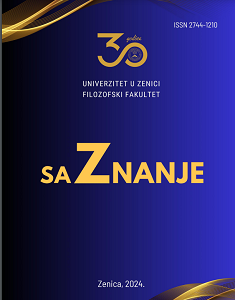EDUKACIJA ZA 21. STOLJEĆE: POVRATAK PRIRODI – ULOGA ODGOJITELJA
EDUCATION FOR THE 21ST CENTURY: RETURN TO THE NATURE - THE ROLE OF THE EDUCATOR
Author(s): Emili ŠegonSubject(s): Education, Preschool education, Transformation Period (1990 - 2010), Present Times (2010 - today), Sociology of Education, Pedagogy
Published by: Filozofski fakultet, Univerzitet u Zenici
Keywords: Child researcher; education; nature; preschool children; 21st;
Summary/Abstract: Values acquired in early childhood often shape an individual's life path, underscoring the importance of focusing on educational strategies that promote a child's connection with nature. Nature serves as a rich source of experiences that offer children opportunities for education and holistic development. Time spent in nature fosters physical activity, creativity, cognitive development, emotional regulation, and relationship building. This article explores theoretical foundations related to the child and the environment, examining the child from a researcher's perspective and analyzing the impact of nature on a child's development and well-being. With a specific emphasis on 21st-century education, the research aims to determine, based on a sample of preschool educators, the role and influence in establishing a child's connection with nature and promoting healthy lifestyle habits. The study involved 150 preschool educators from the Republic of Croatia. The results indicate a high awareness among educators regarding their crucial role in fostering a child's connection with nature, with 70.7 % (N=106) recognizing this responsibility. Concurrently, a continued interest in outdoor activities was noted by 76.6 % (N=115) of educators. Despite recognized benefits, key limiting factors for nature-related activities include the large number of children in groups and the structure of educators' working hours. In the context of modern education, the research emphasizes the need to adapt the structure of work and educational approaches to optimally leverage the benefits of the natural environment in fostering holistic child development. The integration of nature-based activities should become an integral part of the educational process, contributing to shaping future generations as aware and responsible citizens. Managing the number of children in groups and providing flexibility in educators' working hours are crucial elements for adjusting the educational system to reflect the needs of children in the 21st century.
Journal: saZnanje
- Issue Year: 4/2024
- Issue No: 4
- Page Range: 958-974
- Page Count: 17
- Language: Croatian

